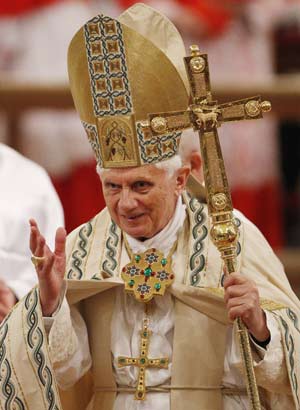 Pope Benedict XVI greets Christian leaders as he leaves an ecumenical evening prayer service that marked the close of the Week of Prayer for Christian Unity at the Basilica of St. Paul Outside the Walls in Rome Jan. 25. (CNS photo/Paul Haring)VATICAN CITY –– As a cardinal, Pope Benedict XVI was a card-carrying organ donor. But the card became invalid when he became pope, according to his personal secretary.
Pope Benedict XVI greets Christian leaders as he leaves an ecumenical evening prayer service that marked the close of the Week of Prayer for Christian Unity at the Basilica of St. Paul Outside the Walls in Rome Jan. 25. (CNS photo/Paul Haring)VATICAN CITY –– As a cardinal, Pope Benedict XVI was a card-carrying organ donor. But the card became invalid when he became pope, according to his personal secretary.
The issue arose when a German doctor recently began promoting organ donation by citing the pope’s enlistment in the organ-donor program more than 30 years ago. The Vatican asked the doctor to stop using the pope as an example, and the pope’s secretary, Msgr. Georg Ganswein, explained the reasons in a letter.
“While it is true that the pope has an organ donor card, it is also true that, contrary to some public affirmations, the card issued in the 1970s became ipso facto invalid with Cardinal Ratzinger’s election to the papacy,” the letter said, according to Vatican Radio.
Archbishop Zygmunt Zimowski, president of the Pontifical Council for Health Care Ministry, told reporters that the most evident reason a pope could not donate organs was that, in a sense, “his body belongs to the whole church.” He said the church’s tradition that a pope’s body be buried intact also reflected the possibility of future veneration.
“That takes nothing away from the validity and the beauty of donating one’s organs,” the archbishop added.
Other Vatican sources said church officials were worried that the publicity in Germany about the 83-year-old pope as an organ donor might create “unrealistic expectations” when the pope dies.
Pope Benedict has called organ donation a generous “act of love.” In 2008, he told a Vatican conference that “tissue and organ transplants represent a great advance of medical science and are certainly a sign of hope for the many people who suffer from serious and sometimes critical medical conditions.”
